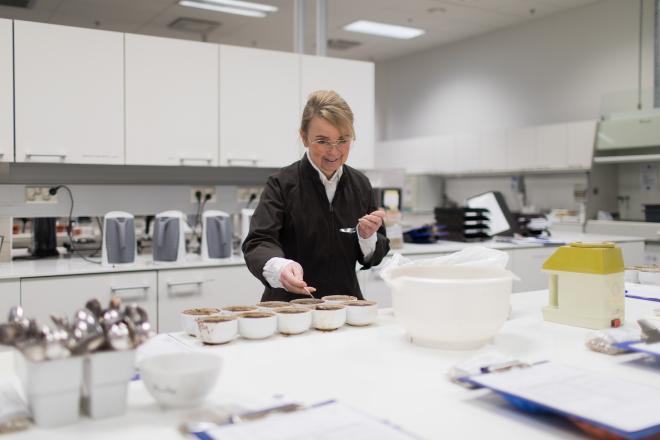Marja Touri, Paulig’s Head of Cupping, tastes 200–300 cups of coffee every day and puts the taste of coffee into words. At home, she prefers to drink coffee out of a cup that is the best fit in the world for her hand and mouth. “The thickness of the rim and the weight of the cup are ideal.”
According to Marja Touri, Paulig’s Head of Cupping, coffee is a luxury that belongs to everyday life. Finns drink very high-quality coffee.
“Coffee calms things down and gives people strength. Many of us will sometimes say “I need a cup of coffee right now”. Coffee moments can be a social event or something you reward yourself with. I always have high expectations for coffee. And when those expectations are met, I feel happy. It’s an all-encompassing sensation,” says Touri.
It’s no wonder that Touri became a top coffee professional. Her grandmother used to have very high standards for the taste of coffee. She would always grind the coffee with a manual coffee grinder just before making it. At five years old, Touri was already having afternoon coffee with her grandmother.
“When I heard the sound of the coffee grinder, I stopped playing. At that time, I took my coffee with lots of milk and sugar,” says Touri.
She was never forbidden from drinking coffee when she was a child. Having her coffee moment was very important for her grandmother and she had a set time for it.
“My grandmother wanted to enjoy the best possible taste of coffee. When she had guests over, they barely had the time to take off their coats before she started making coffee.”
Putting taste into words
Touri has not lost her interest in coffee over the years – quite the opposite.
“I have worked for Paulig for 34 years and have been the Head of Cupping for 16 of those years. I find coffee very interesting, and I’m constantly learning new things as the world keeps changing and new perspectives and meanings enter coffee culture. The world of coffee has become more diverse, and people expect more from their coffee,” says Touri.
Resulting from roasting, the aroma of coffee is the combination of hundreds of elements. Over a thousand aromatic substances have been identified in roasted coffee – much more than in, for example, wine.
For professional coffee cuppers, being able to taste the different nuances of coffee is not enough, you must also be able to express them in words.
“For example, coffee can have a taste of spring onion stems with a bit of chocolate added in. That may sound strange, but it’s a very fitting description for a certain kind of coffee. Looking for different nuances of flavour and coming up with descriptions is a very large part of coffee cupping.
So, what does Juhla Mokka, the favourite coffee of Finns, taste like?
“Juhla Mokka coffee has light berry notes and there is a good balance between its acidity and aromatic nuances. Making sure that the taste remains consistent over the years requires plenty of work and experience. For me, Juhla Mokka coffee is like a trusted friend – you can talk about anything over a cup of Juhla Mokka,” says Touri.
“Over the years, I have many good memories that have to do with Juhla Mokka coffee. For example, I value the moments when, after returning home from a trip, I get to make myself a cup of Juhla Mokka coffee and drink it in my own home without anyone to bother me.”

The most suitable cup in the world
Touri has a favourite cup that she always uses for drinking coffee at home.
“The cup is the best fit in the world for my hand and mouth: the thickness of the rim and the weight of the cup are ideal.”
The taste of coffee is an all-encompassing thing. Sustainability also has a strong effect on it. Touri wants to know where the coffee she drinks comes from.
“People are more and more interested in this matter. We must be able to connect the coffee to the people who make it. The fact that the coffee tastes good is not enough – we also want to know its backstory. Coffee comes to us from very far away. That is another reason why the origin of coffee is so important to people. I’m happy and proud that, at Paulig, we invest in sustainability every day and closely follow its principles in everything we do.”
8.1.2020